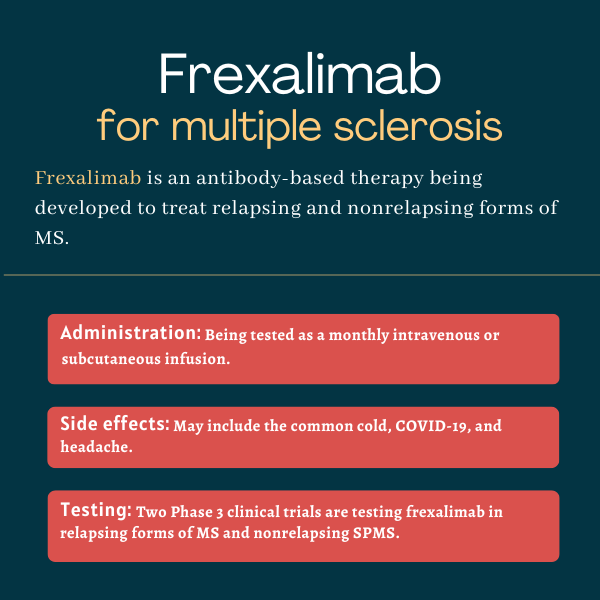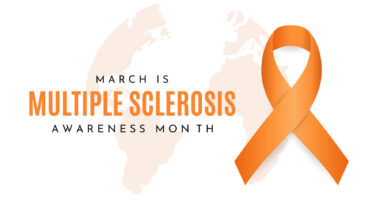 Discussion
Discussion
Frexalimab for multiple sclerosis
Last updated Oct. 2, 2025, by Marisa Wexler, MS

What is frexalimab for MS?
Frexalimab is an antibody-based therapy Sanofi is developing as a potential treatment for relapsing forms of multiple sclerosis (MS), as well as nonrelapsing secondary progressive MS (SPMS).
Administered via monthly infusions into the bloodstream (intravenously) or under-the-skin injections (subcutaneously), the therapy has been shown in clinical trials to reduce disease activity. It may also slow the progression of disability among patients.
MS is caused by inflammation that damages nerve cells in the brain and spinal cord. Frexalimab is designed to reduce new and ongoing inflammation by blocking CD40L, a protein involved in the CD40/CD40L molecular pathway, which regulates the activity of various immune cells.
Studies have suggested that this pathway is abnormally active in MS and other autoimmune diseases, implying that reducing its activity could lessen disease-driving inflammation. However, previous antibodies targeting the CD40L protein led to serious blood clots in some patients, likely caused by platelet aggregation, or clumping.
Frexalimab is a second-generation antibody that was developed to reduce off-target effects and address these safety issues.
Therapy snapshot
| Treatment name: | Frexalimab |
| Administration: | Intravenous infusion and subcutaneous injection |
| Clinical testing: | In Phase 3 trials for relapsing forms of MS and nonrelapsing SPMS. |
How will frexalimab be administered in MS?
In a Phase 2 proof-of-concept study in MS patients, frexalimab was administered either as a 1,200 mg dose, taken via monthly intravenous infusions, or a 300 mg dose, given every other week by subcutaneous injections. In the trial’s extension, the subcutaneous formulation was then administered monthly at a dose of 1,800 mg to match the exposure seen with the intravenous dose.
In the ongoing Phase 3 clinical trials, the medication is being administered monthly by intravenous infusion, but the dose being tested has not been disclosed.

Frexalimab in MS clinical trials
Frexalimab has been tested in a proof-of-concept Phase 2 trial involving people with relapsing forms of the disease, namely relapsing-remitting MS (RRMS) and active SPMS.
Following positive results from the trial and its extension part, Sanofi launched two Phase 3 studies that are now testing the medication in a much larger population of relapsing MS patients, as well as in individuals with nonrelapsing SPMS.
- The Phase 2 clinical trial (NCT04879628) enrolled 129 patients and randomly assigned them to receive frexalimab intravenously or subcutaneously, or a placebo, for about three months. The results showed that both frexalimab groups developed significantly fewer lesions with active inflammation (up to 89% less), as well as new and enlarging lesions (up to 92%) after three months. The rates of these lesions remained low after two years of treatment in a long-term extension portion, and 92% of patients remained free from relapses during follow-up.
- The FREXALT Phase 3 trial (NCT06141473) is now seeking to confirm those findings in approximately 1,600 adults with RRMS and active SPMS, who will be randomly assigned to receive monthly frexalimab infusions or the approved oral therapy Aubagio (teriflunomide). The main goal is to evaluate the effect of treatment on relapse rates after about three years, while key secondary goals are to determine its impact on disability worsening and improvement.
- The other Phase 3 study, FREVIVA (NCT06141486), is enrolling approximately 900 people with nonrelapsing SPMS who have experienced disability progression in the absence of relapses. Its primary goal is to evaluate whether frexalimab outperforms a placebo at delaying confirmed disability progression after three years of follow-up.
Frexalimab side effects
Frexalimab is still being tested in clinical trials for MS, so its safety profile is not fully established. While more data are needed, the most common side effects reported during a Phase 2 trial study and its open-label extension included:
- the common cold
- headache
- COVID-19
Multiple Sclerosis News Today is strictly a news and information website about the disease. It does not provide medical advice, diagnosis, or treatment. This content is not intended to be a substitute for professional medical advice, diagnosis, or treatment. Always seek the advice of your physician or other qualified health provider with any questions you may have regarding a medical condition. Never disregard professional medical advice or delay in seeking it because of something you have read on this website.
Recommended Posts
- Ironically, cutting out coffee gave me a boost of energy
- MS Awareness Month events highlight advocacy, education, fundraising
- I’m going to be more open about my invisible scars from MS
- Having parents who smoked increases risk of pediatric MS: Study
- Ocrevus and Tysabri appear to work equally well to control relapsing MS
Related articles
-
 Discussion
Discussion
-
-




